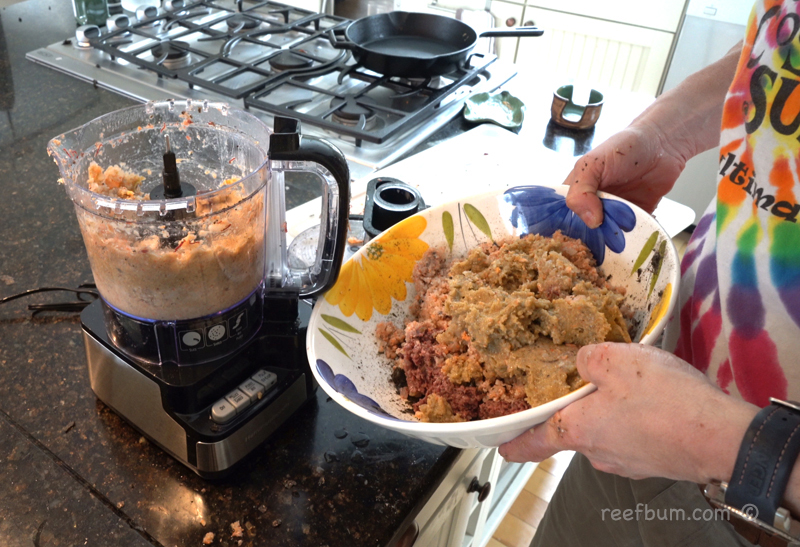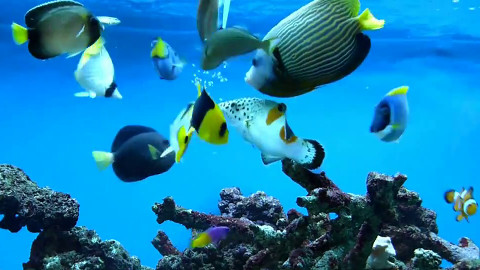Coral Fish Food thrive on a diet rich in marine algae, zooplankton, and small crustaceans. Appropriate feeding maintains their vibrant colors and health.
Coral reefs are busy places where lots of sea creatures live. They give food and shelter to coral fish. When people want to copy these conditions at home, it’s important to know what coral fish eat. A balanced mix of protein-rich and plant-based foods is essential for their well-being.
You can pick from different foods like frozen, live, or special pellets and flakes to give your fish a good diet. Choosing the right food for each type of fish in your tank helps keep them healthy and makes your tank thrive. Knowing what each fish enjoys to eat helps you create a feeding plan same their natural diet.
Table of Contents
Types Of Coral Fish Food
Keeping a vivid coral aquarium is rewarding. It starts with correct feeding. Healthy coral fish flourish with the right diet. Let’s explore the food types that bring color and vigor to your underwater haven.
Dry Food Options
Dry foods are convenient for coral fish care. They store well and are rich in nutrients. Here’s a brief look at the popular dry food forms:
- Pellets: Compact and dense, pellets sink slowly, allowing fish to feed easily.
- Flakes: They float and then graduate fall, attracting fish at different water levels.
- Granules: A hybrid, granules settle mid-water, perfect for various feeding zones.
- Powders: With a fine consistency, powders cater to small coral fish and filter feeders.
Frozen Food Options
Frozen foods provide a balanced diet. Freezing locks in vital nutrients without preservatives. Consider these frozen treats:
- Mysis shrimp: High in fat and protein, shrimp boost growth and health.
- Brine shrimp: An all-time favorite, brine shrimp are a source of energy and fun to chase.
- Squid: Cut into small pieces, squid is a meaty food for larger fish.
- Plankton: Nutrient-rich, plankton caters to both fish and corals.
Live Food Options
Live foods trigger natural hunting instincts. They stimulate activity and promote a thriving tank.
| Live Food Type | Benefits |
| Copepods | Stimulate feeding behavior, enhance coloration |
| Rotifers | Easy to culture, ideal for small coral fish |
| Feeder fish | Encourage natural predatory skills in larger species |
| Phytoplankton | Directly feed corals, maintain water quality |
Considerations For Choosing Coral Fish Food
When you explore the vivid world of coral fish, providing the right type of food is essential. Coral fish are diverse, and so are their dietary needs. To keep your underwater friends healthy and colorful, know what food they need. Let’s dive into the main factors to consider when selecting the right coral fish food.
Nutritional Content
Like humans, coral need good food with lots of important stuff in it. Look for food that has proteins, fats, vitamins, and minerals to help them grow well and stay healthy. Check the label on coral fish food to make sure it has these important things.
- Proteins – Support tissue repair and growth.
- Fats – Provide energy and help in vitamin absorption.
- Vitamins and Minerals – Crucial for the immune system and health.
Feeding Habit Of Fish Species
Bear in mind that different fish have unique feeding behaviors. Some species may be bottom-dwellers, while others are open-water feeders. Match the food choice to their natural habits to ensure they can eat easy and comfortably.
| Feeding Zone | Examples |
| Surface | Flake foods, floating pellets |
| Mid-water | Sinking pellets, frozen food |
| Bottom | Sinking granules, tablets |
Food Size And Shape
The size and shape of food particles can greatly influence how well your coral fish eat. Smaller fish need tiny, easy-to-swallow options, whereas larger fish can handle bigger pieces. Selecting the correct size and shape prevents feeding difficulties and promotes proper digestion.
- Small Fish – Choose micro-pellets or fine granules.
- Medium Fish – Standard flakes or small pellets work well.
- Large Fish – Opt for larger pellets or chunky food items.
Feeding Techniques For Coral Fish
Feeding coral fish right keeps them healthy and colorful. They need special attention for their diet. Watch how often and how much you feed them, and see how they act to keep them happy in your tank.
Frequency Of Feeding
Coral fish need regular meals. Most thrive on feed twice daily. Consistency is key for their well-being. Younger fish may need more frequent feedings due to their growth demands.
Amount Of Food To Offer
Overfeeding can harm your fish and the tank environment. Offer only as much food as your fish can consume in 3 minutes. This method prevents waste and maintains water quality.
| Fish Size | Food Amount |
| Small Fish | Pinch of food |
| Medium Fish | Two pinches of food |
| Large Fish | Three pinches or more |
Observing Fish Behavior
Watch your fish during feeding times. Healthy fish are eager to eat. Changes in behavior may say illness or stress. Adjust feeding as necessary based on their activity and interest in coral fish food.
- Energetic fish – Good health sign
- Lethargic fish – Possible health issue
- Ignored food – Overfed or unwell

Credit: www.youtube.com
Common Mistakes In Feeding Coral Fish Food
The health and vibrancy of coral fish food hinge on proper nutrition. But many people who love aquariums make mistakes that can hurt their fish. From how much they feed them to how they keep food, these common errors could harm coral fish. Identifying and correcting these oversights is key to maintaining a healthy underwater ecosystem.
Overfeeding
Overfeeding is a prevalent issue that can lead to serious tank problems. Feeding too much makes fish fat and leaves food to rot in the water. This extra food turns into bad stuff that can make the water dirty and let bad germs grow.
- Watch how much you feed: Make sure coral fish finish their food quickly. Keep an eye out for leftovers: Check the tank often for uneaten food and remove it right away.
- Feeding schedule: Stick to a consistent feeding timetable to prevent overindulgence.
Underfeeding
Conversely, underfeeding can leave coral fish malnourished and weak. Insufficient nutrition compromises their immune systems, making them more susceptible to diseases. A balanced diet supports growth and vitality.
- Understand the dietary needs specific to your coral fish species.
- Offer a varied diet to cover all nutritional requirements.
- Check fish behavior and health to gauge if their dietary needs are meeting.
Improper Food Storage
Food quality significant affects coral fish health. If not stored correct, food can lose its nutritional value or become contaminated. Always seal packages tight and keep food in a cool, dry place away from direct sunlight. Here’s a table guide for proper food storage:
| Food Type | Storage Method | Shelf Life |
| Flakes | Airtight container | 3-6 months |
| Pellets | Airtight container | 6-12 months |
| Frozen Foods | Freezer | Up to 6 months |
Check end dates often. Don’t use old or bad food to keep fish healthy.
Best Practices For Feeding Coral Fish Food
Welcome to our guide on Best Practices for Feeding Coral Fish food. This post will dive into the essentials of nurturing your aquatic companions. Learn how to ensure their health and vibrancy with proper feeding habits.
Frequency And Quantity
Feeding your coral fish the right amount at the right time is crucial. Stick to a consistent schedule to support their natural feeding patterns.
- Twice a week is a good starting point for most coral species.
- Small portions prevent overfeeding and maintain water quality.
Proper Feeding Techniques
Targeted feeding ensures corals receive their nutrition without excess waste.
- Use a pipette or turkey baster to direct food to each coral.
- Thaw, rinse, and cut frozen foods into appropriate sizes.
Consider food types such as:
| Food Type | Benefit |
| Marine snow | Mimics natural diet |
| Phytoplankton | Provides essential nutrients |
| Zooplankton | Stimulates growth |
Monitoring And Adjusting
Keep a close eye on your coral fish’s response to feeding.
- Observe if corals are expanding to capture food.
- Check for leftover food which indicates overfeeding.
- Adjust frequency and quantity as needed for optimal health.
Remember, clean, high-quality water is as important as food. Regular testing helps maintain the environment for your coral fish.

Credit: reefs.com
Tips For Enhancing Coral Fish Health Through Nutrition
Healthy coral fish are a wonder to behold in an aquarium. They add color, life, and vibrancy to the underwater world. Proper nutrition plays a crucial role in ensuring these aquatic beauties thrive. Let’s dive into some key tips for boosting coral fish health with the right food choices.
Supplementing With Vitamins And Minerals
Nutrition-packed diets are vital for coral fish. Vitamins and minerals protect against diseases. Think of adding supplements to their meals. Here are the essentials they need:
- Vitamin C for a strong immune system
- Vitamin E to combat stress
- Calcium and Magnesium for robust bones and scales
Tablets or liquid vitamins are good options. Always follow label instructions to give the right amount.
Rotational Feeding
Imagine eating the same meal daily. Sounds boring, right? Coral fish feel the same. Vary their diet for better health. Here’s how:
- Fish flakes one day
- Freeze-dried worms next
- Algae wafers to finish the week
This rotation ensures a range of nutrients reach your fish regular.
Avoiding Overfeeding
Too much food is as bad as too little. It can lead to obesity and tank pollution. Always remember:
- Feed small portions more often. Two minutes of eating, a couple of times a day, is perfect.
- Watch your fish during feeding. If food sinks untouched, it’s too much.
- Leftovers should not stay on the tank bottom. Clean them right away.
Impact Of Proper Nutrition On Coral Fish Health
Feeding coral fish the right food is like giving them a treasure of health. like people, these colorful swimmers need balanced diets to stay healthy. Good food helps fish stay healthy, look colorful, and grow strong.
Improved Immunity
Strong immune systems keep fish safe from diseases. The right food holds key vitamins and minerals. This builds a shield inside them. It’s like they have superpowers against germs!
- Vitamin C and E – warriors against illness
- Zinc and selenium – boosts their protective barriers
Vibrant Coloration
Catchy colors of coral fish come from what they eat. Nutrients like carotenoids work magic, making their scales shine like gems. Good food turns them into swimming rainbows!
| Nutrient | Role | Food Source |
| Carotenoids | Color enhancers | Algae, krill |
| Omega-3 fatty acids | Shine boosters | Plankton, shrimp |
Enhanced Growth
- Proteins – building blocks for muscles
- Calcium – for strong bones, like ours!
- Fats – stores energy for them to swim and play
Right food choices mean coral fish can grow proper. Think of it as giving them the best fuel for their bodies. It sure makes a big difference!

Credit: www.reef2reef.com
Some Asked Questions
What Do You Feed Coral Fish?
Feed coral fish a mix of meaty foods, like Mysis shrimp and brine shrimp, and algae-based flakes or pellets. Ensure variety for a balanced diet.
What Do Coral Fish Eat?
Coral fish primarily feed on algae, plankton, and small crustaceans. Their diet can also include tiny fish and organic debris depending on the species.
What Food Do Corals Eat?
Corals primarily feed on tiny plankton and algae. Some also absorb dissolved nutrients from water.
When Should I Feed My Corals?
Feed corals at night when their polyps are open and active. Feed your fish regular, like 2-3 times a week, to keep them healthy and growing. Change the schedule based on your coral’s needs and how they react to feeding..
What Is Coral Fish Food Made Of?
Coral fish food contains marine proteins, algae, vitamins, and minerals.
How often Coral Fish Be Feeding?
Feed coral fish 2 to 3 times a week. Make sure they finish eating quick to avoid food piling up.
Can Coral Fish Eat Tropical Flakes?
Some coral fish enjoy tropical flakes, but they need special food.
Conclusion
Feeding coral fish proper is crucial for their health and vibrancy. Pick the right food and stick to a regular schedule. You’ll see a big change.. Keep their dietary needs in mind to maintain a thriving aquarium. Continual learning and adaptation will ensure your underwater community flourishes.
Happy feeding!








Leave a Reply